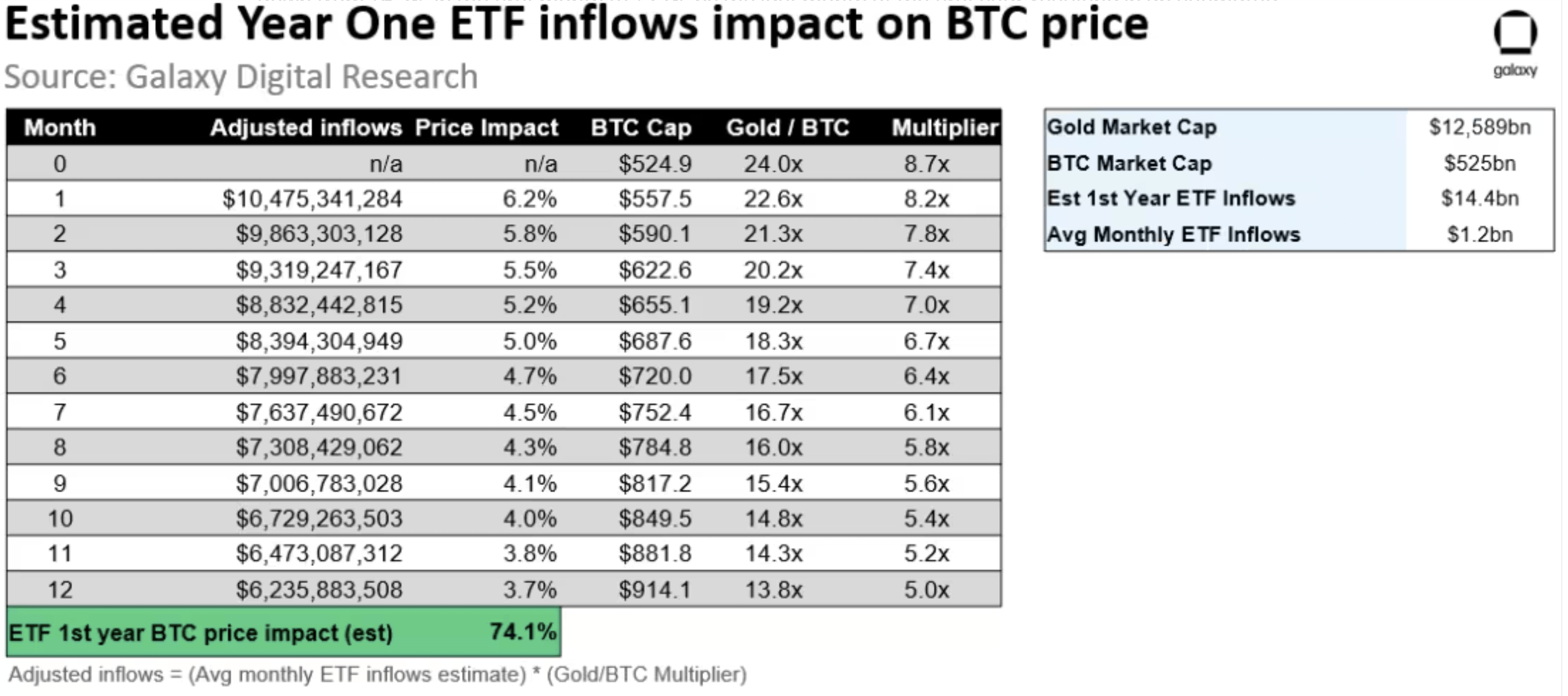Galaxy Digital, a leading digital asset player, has issued a bullish forecast for Bitcoin’s trajectory following the launch of its highly anticipated US-regulated spot Bitcoin ETF. According to a recent study published by the company on October 24, the introduction of the ETF will significantly strengthen Bitcoin’s adoption, further positioning it as a recognized asset class.
Benefits of an ETF
Galaxy S analysis emphasizes that a spot Bitcoin ETF “would be one of the most impactful catalysts for Bitcoin (and crypto as an asset class) adoption.” At the end of September, Bitcoin assets in various investment products such as ETPs and closed-end funds reached an impressive figure of 842,000 BTC, worth approximately $21.7 billion.
Galaxy Digital’s research also sheds light on the challenges faced by these investment opportunities, pointing to factors such as high fees, tracking error, limited liquidity and somewhat limited reach among broader investor groups. The report suggests that the introduction of the spot Bitcoin ETF will dramatically change this scenario.
Spot Bitcoin ETFs offer a host of advantages over current structures: an improved fee system, greater liquidity, better price tracking, and a much-needed break from the complications of self-custodial assets. As the report explicitly states: “The presence of a US-regulated spot Bitcoin ETF that adheres to strict regulatory compliance not only provides a more secure platform but also increases its transparency, making it a preferable choice over existing investment products.”
Why a Spot Bitcoin ETF is Important
Galaxy believes that introducing a Bitcoin ETF would increase “accessibility of digital assets across all wealth segments” and “drive greater adoption through formal recognition by regulators and trusted financial service providers.”
The report highlights the disparity between age groups when it comes to Bitcoin investments. It shows that while Boomers and older generations hold 62% of US wealth, only 8% of adults aged 50 and over have invested in cryptocurrency.
Galaxy views regulatory approval for a Bitcoin ETF as an important step toward establishing Bitcoin as a mainstream investment. An ETF could help reduce market volatility by providing “greater price transparency and discovery for market participants.”
Estimating inflows from ETF approval
Galaxy’s forecast suggests that the US asset management industry, which manages combined assets worth $48.3 trillion, will be most affected by the launch of a Bitcoin ETF. They estimate potential inflows into the Bitcoin ETF at around $14 billion in the first year, rising to $27 billion in the second year and up to $39 billion in the third year.
Taking into account the historical relationship between gold ETF fund flows and gold price change, Galaxy predicts a potential 6.2% price increase for BTC in the first month after an ETF launch. They expect this to decline to +3.7% in the last month of the first year, resulting in an estimated +74% increase in BTC in the first year of an ETF approval. At the current price, this would mean that BTC could rise above $59,000 in the post-ETF debut year.

The bigger picture
In addition to the potential inflows into a US ETF product, Galaxy predicts there will be a much larger impact on BTC demand “due to second-order effects.” The possible approval of a spot ETF in the US could lead to similar products in other global markets. Additionally, Galaxy expects that several other investment vehicles, such as mutual funds and private funds, will integrate Bitcoin into their strategies.
Galaxy suggests that Bitcoin’s Total Addressable Market (TAM) could grow substantially, perhaps encroaching on traditional asset sectors such as real estate and precious metals. The estimated potential new inflows into BTC could range from $125 billion to $450 billion “over an extended period.”

Featured image from Shutterstock, chart from TradingView.com

